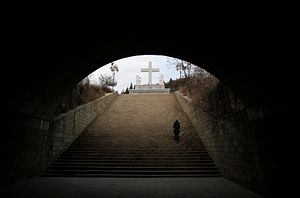If Karl Marx is to be believed and religion is the “opiate of the masses,” then China is waging a new opium war. Threatened by the rapid, uncontrolled growth of Christianity, the Communist Party is gearing up for a sweeping crackdown.
Although China is officially an atheist nation, Protestant Christianity is thriving. According to some estimates, there are as many as 115 million Protestants in China, and it is one of the fastest growing demographics in the country. One analyst predicts that by 2030, China will have more than 247 million Christians, including Catholics, making it the world’s largest congregation.
But much to the authoritarian government’s chagrin, the overwhelming majority of this booming cohort of Chinese Christians are meeting in underground churches. Only state-sanctioned religious organizations are allowed to operate in China, and official churches are closely watched.
In recent years, many state-sanctioned churches have been forced to install surveillance cameras, and preachers, selected by the government, are monitored to ensure that their sermons do not broach taboo topics.
“They want the pastor to preach in a Communist way. They want to train people to practice in a Communist way,” said an underground church leader, who spoke anonymously to the Telegraph.
The preacher explained that state churches often avoid potentially subversive portions of the Bible. For instance, the Old Testament book that tells the story of Daniel, who is exiled and refuses to worship the king as he is ordered and instead worships God, is “very dangerous.”
Preachers have also been pressured to show their loyalty to the Communist Party and have taken to praising President Xi Jinping and incorporating party propaganda into their sermons.
It is these heavy-handed tactics that have made many Chinese Christians turn to underground churches. According to Yang Fenggang, a professor of sociology at Purdue University, of China’s estimated 93 to 115 million Christians, less than 30 million attend official churches.
This disparity has caught the attention of state officials, and earlier this month new regulations aimed at curbing non-state sanctioned houses of worship were passed.
The new law takes effect on February 2, 2018 and will impose heavy fines on organizers of unofficial religious events and prohibit them from carrying out basic functions like receiving donations, providing religious information online, or teaching children.
Wang Zuoan, head of the State Administration for Religious Affairs, explained that the new law was necessary because “the foreign use of religion to infiltrate [China] intensifies by the day and religious extremist thought is spreading in some areas.”
While Article 36 of the Chinese constitution ensures that citizens “enjoy freedom of religious belief,” Wang said, “freedom of religious faith is not equal to religious activities taking place without legal restrictions.”
“These rules will help maintain the Sinicisation of religion in our country … and keep to the correct path of adapting religion to a socialist society,” he added.
The Communist Party has watched Christianity’s rapid growth warily, with some arguing that the state has long been concerned that the religion could undermine its authority.
According to Yang, the Communist Party is “still not sure if Christianity would become an opposition political force” and fears it could be used by “Western forces to overthrow the Communist political system.”
Two years ago, the government moved aggressively against Christian churches. In Zhejiang, the provincial governor, one of President Xi’s top lieutenants, tore down crosses from 1,200 to 1,700 churches and jailed hundreds of house church leaders.
The campaign was met with strong international condemnation and local protests. In one violent incident, 50 church members were injured when they were beaten back by police officers.
Eager to minimize embarrassing incidents and project an image of social harmony in the buildup to the 19th National Congress, party officials have avoided overly aggressive actions against underground churches. Instead, they have moved more quietly with their attempts to “Sinicize” Christianity.
In addition to passing the new law, China has been working to exert greater control over official Catholic churches. Six decades after China broke off diplomatic relations with the Vatican, the two sides are negotiating an agreement to re-establish formal ties.
An agreement would legitimize China’s state-sanctioned churches while further cementing its control. But efforts have stalled, with both sides insisting on having the ultimate authority to appoint clergy.
As China negotiates with the Vatican, the government has eased up on the nation’s 12 million Catholics, according to a report from Freedom House. However, authorities have continued to pressure underground churches, arresting members and pastors on trumped up charges in the hopes of pushing them to join official congregations.
These efforts are not likely to succeed, as they work to reinforce the concerns underground churchgoers have about state churches. Instead, underground churches have taken to lowering their profile by meeting in smaller groups or on weekdays to avoid detection in advance of the new law taking effect. Larger WeChat groups for churches have also been pared back to smaller groups of 30 to 40.
From college campuses and the the media to the military, churches are just another battleground in President Xi’s efforts to ensure the Communist Party reigns supreme in all walks of life. Religious expression will be allowed to continue in a token form so long as it conforms to the standards set by party officials.
While the Communist Party has developed increasingly sophisticated ways to manipulate its citizens, it remains to be seen if the government can successfully subvert a religion that has withstood repeated repression over its 2,000 year history. Given Christianity’s long, enduring track record, party officials are perhaps rightly worried.
Eugene K. Chow writes on foreign policy and military affairs. He has been published in The Week, Huffington Post, and The Diplomat.

































